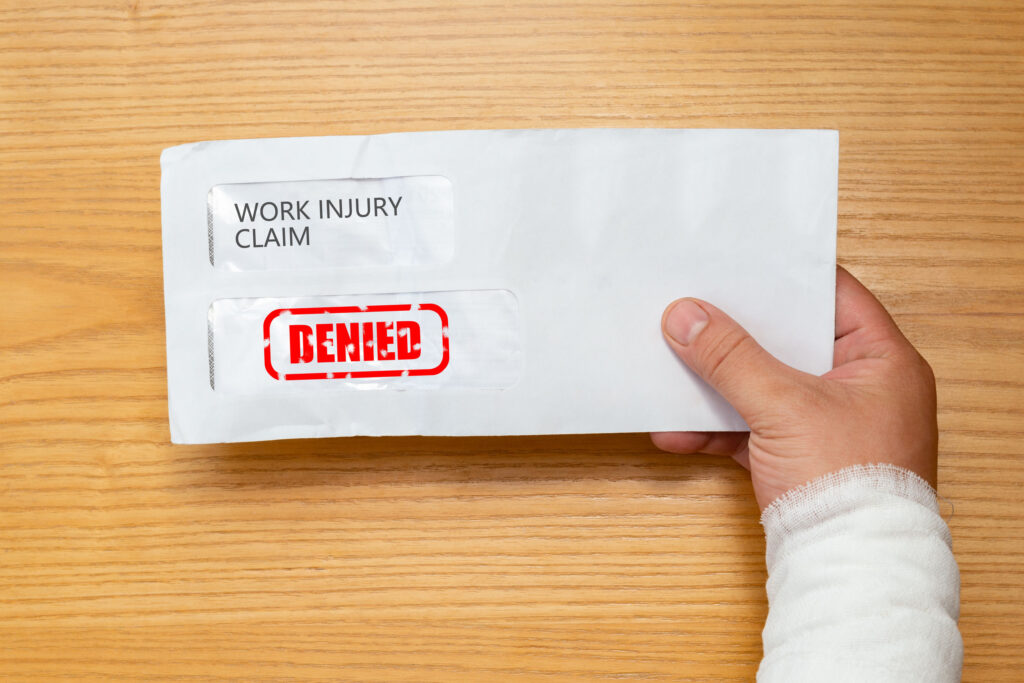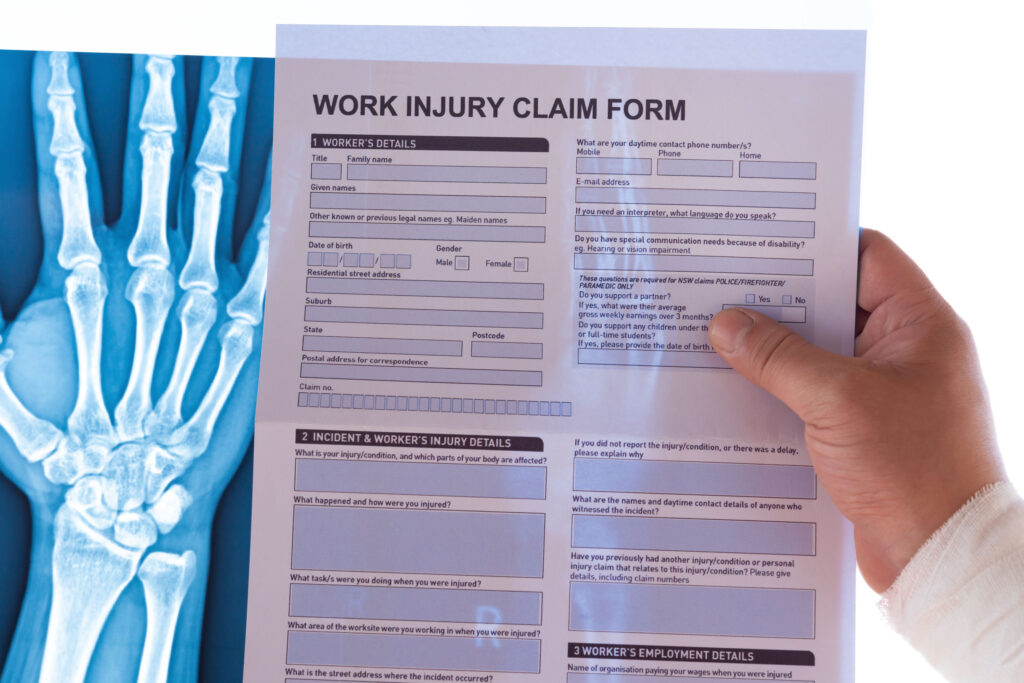
These are many reasons why your Arizona workers’ comp claim was denied. Some of the reasons may be obvious. On the other hand, you may be at a complete loss as to why your claim was denied and what you should do to try to reverse the denial.
Ultimately, when uncertainty strikes, your best hope of getting a fair resolution is to work with an experienced Arizona attorney that specializes in workers’ comp law. Doing so will give you a beneficial advantage to sifting through the often complex ins and outs of Arizona workers’ injury laws.
Common Reasons for Workers’ Compensation Claim Denials in AZ
Employers have a responsibility to help protect their employees from financial hardships resulting from a work-related injury. When a worker is injured, develops an occupational illness, or is wrongfully killed while performing a job-related task, the employer and their insurance company will evaluate the work injury claim to determine approval or denial of coverage.
If an illness or injury is deemed job-related and meets eligibility requirements, the injured worker often receives compensation for medical expenses to include ambulance transport, medications, surgeries, and physical rehabilitation. Workers’ compensation may even pay for a portion of lost wages as a worker recovers.
In addition, eligible workers with serious workplace injuries and illnesses may receive permanent compensation benefits, “job retraining,” and ongoing supportive medical care.
Now that you know what may be covered, let’s go over a few specific possible reasons why your Arizona workers’ comp claim was denied—that is, aside from a general fear of increased insurance premiums.
Your Injury Was Not Work-Related
Your employer’s insurance company may have denied your work injury claim if they believe that any of the following non work-related factors was the actual cause of your injury or illness:
- You have a pre-existing health condition
- You faked your injury
- Your injury happened outside of the scope of your employment
- The injury occurred while driving to or from work or while on an unpaid break
- You were hurt because of horseplay
- Alcohol or illegal drug use was a substantial contributing cause for your work injury
If none of the above are true, you need to carefully document everything that led up to and took place after your injuries occurred or illness developed to help prove that you were harmed while on the clock.
For example, let’s say you suffer an electric shock from a faulty wire while at work which resulted in a heart attack. Your employer’s insurance company may try to argue that your heart attack isn’t a compensable injury under Arizona workers’ comp law because of your pre-existing health condition. However, with careful documentation, you could prove that the attack was the direct result of the electric shock, not an untimely health incident.
You Did Not Receive an Independent Medical Examination
Workers are required to receive an Independent Medical Examination (IME) from an authorized third-party medical provider. This requirement is meant to establish an unbiased diagnosis of any injuries.
You may have a physician of your choice attend and observe the IME if you fear a biased diagnosis, however the cost to do so must be paid out of your own pocket.
If you failed to attend the IME as required, you would be seen as obstructing the examination process, thus relinquishing your rights to receive any benefits.

You Never Took or Failed a Required Drug Test
After a workplace injury, your employer will most likely require you to take a drug test to prove that you were not working while under the influence of an illegal substance. If you failed the test, or did not take the test at all, this could be why your workers’ comp claim was denied.
You Were Late Notifying Your Employer of Your Injury
You must notify your employer of a work injury as soon as you are physically able to do so. Meaning, if you were coherent and able to contact your employer after you fell ill or were injured, you needed to immediately contact them and report what happened.
However, if your injuries were significant and you needed immediate medical care, contacting your employer once you stabilized should be acceptable.
If you were able to notify your employer and failed to do so in a timely manner, this could have resulted in a denial of your Arizona workers’ comp claim.
Your Papers Were Filed Late
After a work-injury happens you are also required to submit a Worker’s and Physician’s Report of Injury form in writing with the Industrial Commission of Arizona (ICA) within one year after the injury occurred by either:
- Filling out and signing a Worker’s and Physician’s Report of Injury at the doctor’s office, OR
- Obtaining and filing a Worker’s Report of Injury directly with the ICA
Missing this deadline is another reason why you may have been denied Arizona workers’ comp benefits. Your employer is responsible for letting their own insurer know as well as the Industrial Commission of Arizona.
Your Employer Does Not Have Workers’ Compensation Insurance
Under Arizona law, your employer is required to have workers’ compensation insurance.
The few exceptions to the rule are businesses and individuals that hire casual or occasional workers, independent contractors, and in-home domestic workers.
Unfortunately, not all businesses adhere to this law as was shown in the ICA’s 2018 annual report:
In the fiscal year of July 2017 through June 2018, there were 91,467 workers’ compensation claims filed. During that same period of time, 424 “no insurance claims” were filed on behalf of employees whose employers violated the law by not providing workers’ compensation insurance.
We understand that you may feel concern if your employer does not have workers’ compensation insurance. Just know that you still have legal recourse to seek out benefits for your workplace injury or illness and our Arizona workers’ comp lawyers are prepared to walk you through the steps of filing a claim.
Despite these six reasons why an Arizona employer would deny your workers’ compensation claim, all is not lost. A skilled workplace injury lawyer knows how to evaluate these types of injury claims, assist with filing an appeal or fighting a denial on eligible claims.
What to Do If Your Work Injury Claim Is Denied
First, you don’t have to accept a denial. You have the right to dispute a job-related injury claim denial by filing an appeal, requesting that a closed claim be reopened, or even filing a complaint.
When to File an Appeal
It’s not uncommon to feel frustrated and betrayed by your employer after receiving a workers’ comp denial letter or a letter with an unsatisfactory amount of compensation listed. We empathize with all who have to fight for benefits while struggling to recover from an injury and/or illness.
On a positive note, the denial letter should provide an explanation on when and how you can file an appeal to dispute the stated denial reason or listed dollar amount.
In Arizona, you have up to 90 days from the date of the denial notice to file an appeal and request a hearing with the Industrial Commission of Arizona’ (ICA) Claims Division.
If you miss the 90-day deadline to file an appeal, you will also miss out on any possibility of getting compensation.
Don’t hesitate to contact a workers’ compensation attorney at Lerner and Rowe Injury Attorneys if you are confused about the filing process and your deadline to appeal. We are here to help you get the compensation that you deserve.
When to File a Workers’ Comp Complaint
There are two instances for when you should file a worker’s comp complaint and request an Administrative Hearing before the workers’ compensation board.
- You are not satisfied with the dollar amount listed on your explanation letter.
- You have solid evidence to prove that your claim was denied as a result of an administrative error, an irregularity, unfair claim processing practices, or fraud.
Requesting an Administrative Hearing takes the decision out of the insurance company’s hands and places it in the hands of an administrative judge.
When you are not prepared to give up and accept what was handed to you, your best course of action is to hire an attorney. You should know that your employer and your employer’s insurance provider will have their own legal team representing their best interests, and so should you.
It cost nothing to find out what an experienced workers’ compensation attorney can do for you. Just find one with a track record of success, a reputation for being compassionate and caring, and years of experience to effectively maneuver through the often complex and confusing processes and laws surrounding workers’ compensation benefits in Arizona.

When to Petition to Reopen a Workers’ Comp Claim
Submitting a petition to reopen a closed workers’ comp claim differs from filing an appeal for a denied claim. The primary difference is that when a worker files a petition to reopen a previously closed claim, they are doing so to secure additional benefits to assist with a new, additional, or previously undiscovered temporary or permanent condition.
You may choose to file a petition to reopen your closed workers’ compensation claim for any of these reasons:
- Your injury has returned or worsened
- You have new evidence to show the compensation previously awarded was unjust or inadequate
- An act of administrative fraud was discovered in connection with your closed workplace injury claim
- The lighter duty job you began after your injuries or illness was eliminated
The process of reopening a denied workers’ comp claim in Arizona begins with you filling out a petition to reopen a closed claim form with the ICA. The petition must also include a medical report, or the name of a physician that will submit a medical report on your behalf proving any new, undiscovered, or worsening conditions.
According to the ICA, “When both the petition and the medical report are received, the insurance carrier is notified of the petition and has 21 days to accept or deny the reopening.”
When to Contact an Arizona Workers’ Comp Lawyer
Not all workers’ comp claims are the same. As such, you may be on the fence on whether or not you would benefit from hiring an attorney to help with your workers’ comp injury claim. Contact us for a free consultation now to learn more about your options.
You shouldn’t have to suffer unnecessary delays, cuts in benefits, or an unjust denial on your own. Putting us in your corner will give you a better chance at getting the compensation you deserve.
Call, chat, or send us more details through our confidential case review form today.



